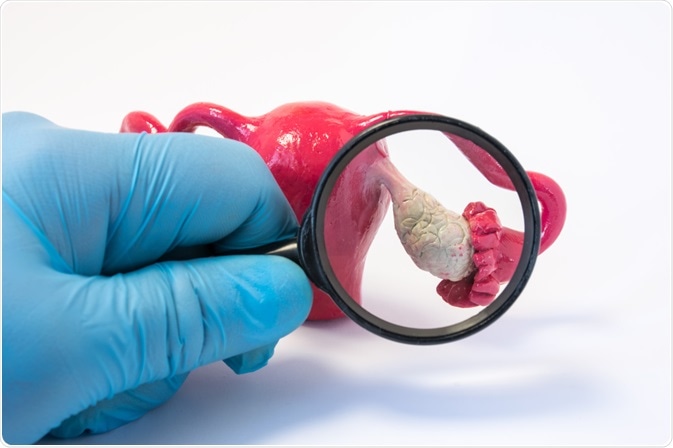Polycystic ovary syndrome (PCOS) is a very common hormonal disorder among premenopausal women, which is characterized by irregular menstruation and high blood levels of male sex hormone.
Genome-wide association studies reveal that several candidate genes are associated with this condition; however, the heterogeneous nature of the disorder indicates that much still needs to be learned about the genetic contributions to PCOS.
 Image Credit: Shidlovski / Shutterstock.com
Image Credit: Shidlovski / Shutterstock.com
What is polycystic ovary syndrome?
PCOS is a condition affecting about 5 – 20% of women who are at reproductive age. The condition is most commonly characterized by infrequent or prolonged menstrual cycle, high blood levels of androgens, and numerous cysts on the ovaries, ultimately leading to infertility. Women with PCOS often develop insulin resistance, which makes them more susceptible to obesity and type 2 diabetes.
How does PCOS develop?
Both genetic and environmental factors are responsible for the pathogenesis of PCOS. Although the exact etiology is unknown, factors that are believed to be associated with PCOS include excessive ovarian secretion of androgens; development of insulin resistance; partial folliculogenesis arrest; and chronic, low-grade secretion of inflammatory mediators from white blood cells.
Various genetic studies reveal that single nucleotide polymorphisms or mutations in as many as 241 candidate genes are associated with different phenotypes of PCOS. Most commonly, genes that encode signaling components related to steroidogenesis, steroid hormone action, gonadotrophin action and regulation, insulin action and secretion, energy metabolism, and chronic inflammation are involved in PCOS pathogenesis.
The severity of the condition depends on the levels of insulin and androgen. Excessive blood insulin level and subsequent insulin resistance ultimately lead to increased secretion of androgen from ovarian theca cells, which in turn causes increased production of free fatty acids from the visceral adipose tissue and disruption of insulin signaling.
Excessive insulin secretion also causes a reduction in the hepatic biosynthesis of sex hormone-binding globulin and insulin-like growth factor binding protein, leading to further worsening of the condition.
What are the genetic factors associated with PCOS?
Although some studies claim that PCOS has an autosomal dominant inheritance pattern, the exact trait of inheritance is considered to be more complex. It is generally believed that the cross-talk between various genetic and environmental factors is the basis of disease development. In recent years, the genome-wide association studies have identified some genetic risk factors that are strongly associated with PCOS.
DENND1A (DENN Domain Containing 1A), encodes a protein associated with clathrin-mediated endocytosis – a process responsible for receptor internalization and recycling. Increased expression of an alternatively spliced variant of DENND1A (DENND1A.V2) has been observed in ovarian theca cells of women affected by PCOS.
In addition, forced expression of the variant in normal theca cells has been shown to increase the expression of CYP17A1 and CYP11A1 (steroidogenic enzymes), resulting in increased production of androgens. Mutation in the CYP21 gene has also been found in PCOS affected population.
In this context, one recent study involving 261 PCOS affected women (age range: 14 – 63 years) from 62 families has identified a rare noncoding variant of DENND1A that is associated with reproductive and metabolic characteristics of these women.
Aromatase is a member of the cytochrome P450 family that plays a crucial role in the conversion of androgens into estrogens. Mutations in several aromatase genes, including CYP11A1, CYP11B2, CYP17A1, CYP19A1, CYP1A1, CYP21A2, CYP3A7, have been reported to play roles in PCOS pathogenesis. These mutations mainly result in ovary dysfunction and elevation in blood androgen levels.
The most prominent gene involved in insulin resistance is the insulin gene (INS). Polymorphic variations in variable tandem repeats of INS have been found to be associated with PCOS pathogenesis.
Another important candidate gene for PCOS is follicle-stimulating hormone (FSH) receptor gene. Polymorphic variations of this gene lead to induction in FSH level and development of resistance to gonadotrophin-mediated ovarian stimulation.
Moreover, the luteinizing hormone/choriogonadotropin receptor (LHCGR) gene is another candidate for PCOS wherein inactivating mutations result in increased LH level, irregular menstruation, and infertility; whereas, activating mutations lead to elevated levels of androgens in women.
Other genes that are located in the susceptibility loci for PCOS include thyroid adenoma associated (THADA) and high-mobility group AT-hook 2 (HMGA2) genes, RAB5B (Ras-related protein) and sulfite oxidase (SUOX) genes, yes-associated protein 1 (YAP1) and zinc finger protein 217 (ZNF217) genes.
Of these candidate genes, THADA and HMGA2 are involved in type 2 diabetes, RAB5B and SUOX are associated with type 1 diabetes, and YAP1 and ZNF217 are involved in cell proliferation and apoptosis.
Sources
Dapas M. 2019. Family-based quantitative trait meta-analysis implicates rare noncoding variants in DENND1A in polycystic ovary syndrome. The journal of clinical endocrinology and metabolism. https://www.ncbi.nlm.nih.gov/pubmed/31038695
Crespo RP. 2018. An update of genetic basis of PCOS pathogenesis. Archives of endocrinology and metabolism. www.scielo.br/scielo.php
Ajmal N. 2019. Polycystic ovary syndrome (PCOS) and genetic predisposition: A review article. European Journal of Obstetrics & Gynecology and Reproductive Biology. www.sciencedirect.com/science/article/pii/S2590161319300948#bib0115
Welt CK. 2014. Genetics of polycystic ovary syndrome. Seminars in reproductive medicine. https://www.ncbi.nlm.nih.gov/pubmed/24715512
Further Reading
Last Updated: Nov 7, 2019